The AMD 3rd Gen Ryzen Deep Dive Review: 3700X and 3900X Raising The Bar
by Andrei Frumusanu & Gavin Bonshor on July 7, 2019 9:00 AM EST** = Old results marked were performed with the original BIOS & boost behaviour as published on 7/7.
Benchmarking Performance: CPU Encoding Tests
With the rise of streaming, vlogs, and video content as a whole, encoding and transcoding tests are becoming ever more important. Not only are more home users and gamers needing to convert video files into something more manageable, for streaming or archival purposes, but the servers that manage the output also manage around data and log files with compression and decompression. Our encoding tasks are focused around these important scenarios, with input from the community for the best implementation of real-world testing.
All of our benchmark results can also be found in our benchmark engine, Bench.
Handbrake 1.1.0: Streaming and Archival Video Transcoding
A popular open source tool, Handbrake is the anything-to-anything video conversion software that a number of people use as a reference point. The danger is always on version numbers and optimization, for example the latest versions of the software can take advantage of AVX-512 and OpenCL to accelerate certain types of transcoding and algorithms. The version we use here is a pure CPU play, with common transcoding variations.
We have split Handbrake up into several tests, using a Logitech C920 1080p60 native webcam recording (essentially a streamer recording), and convert them into two types of streaming formats and one for archival. The output settings used are:
- 720p60 at 6000 kbps constant bit rate, fast setting, high profile
- 1080p60 at 3500 kbps constant bit rate, faster setting, main profile
- 1080p60 HEVC at 3500 kbps variable bit rate, fast setting, main profile
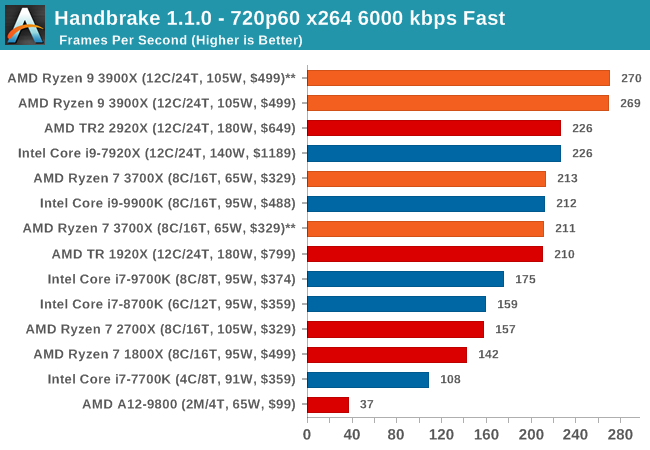
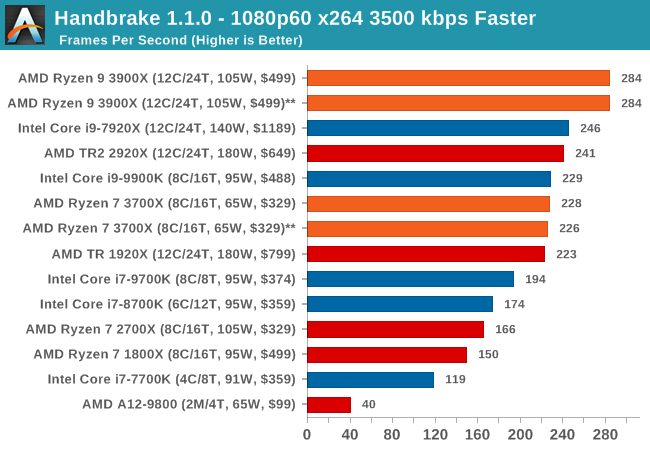
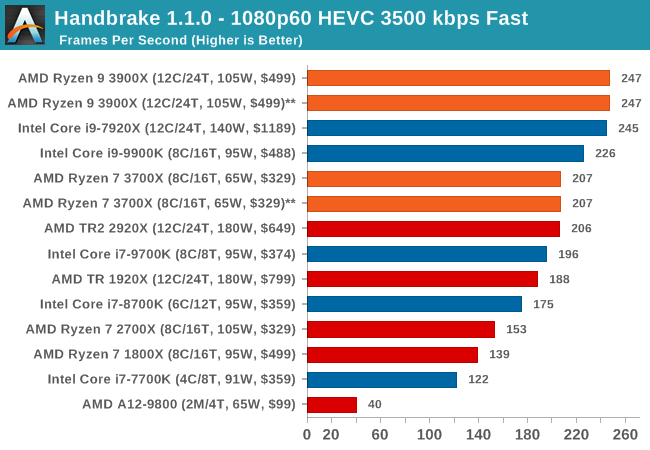
7-zip v1805: Popular Open-Source Encoding Engine
Out of our compression/decompression tool tests, 7-zip is the most requested and comes with a built-in benchmark. For our test suite, we’ve pulled the latest version of the software and we run the benchmark from the command line, reporting the compression, decompression, and a combined score.
It is noted in this benchmark that the latest multi-die processors have very bi-modal performance between compression and decompression, performing well in one and badly in the other. There are also discussions around how the Windows Scheduler is implementing every thread. As we get more results, it will be interesting to see how this plays out.
(Please note, if you plan to share the Compression graph, we'd appreciate it if you could please include the Decompression graph as well. Otherwise you’re only presenting half of the picture)
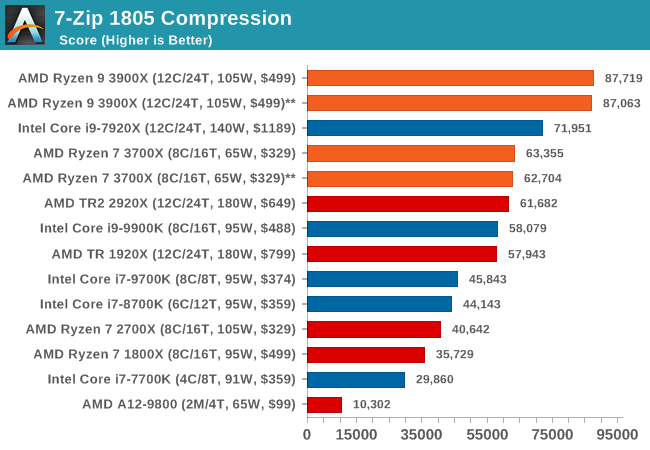
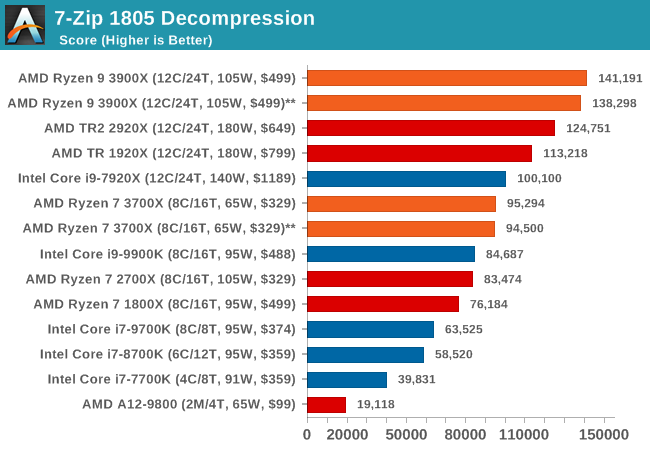
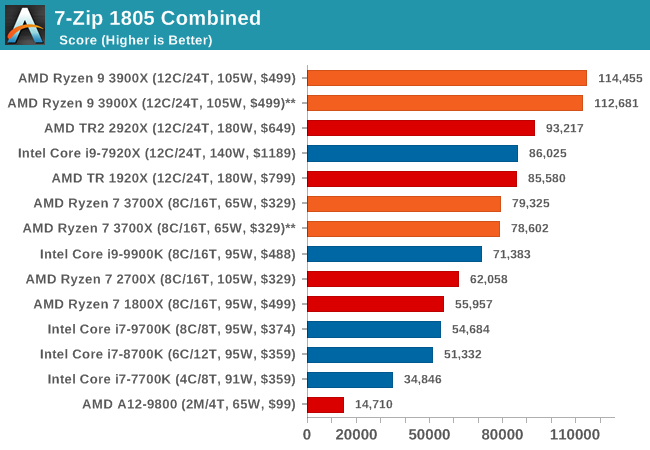
WinRAR 5.60b3: Archiving Tool
My compression tool of choice is often WinRAR, having been one of the first tools a number of my generation used over two decades ago. The interface has not changed much, although the integration with Windows right click commands is always a plus. It has no in-built test, so we run a compression over a set directory containing over thirty 60-second video files and 2000 small web-based files at a normal compression rate.
WinRAR is variable threaded but also susceptible to caching, so in our test we run it 10 times and take the average of the last five, leaving the test purely for raw CPU compute performance.
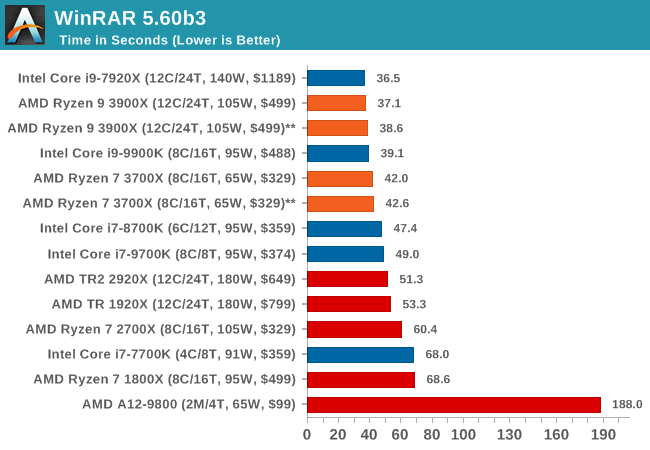
AES Encryption: File Security
A number of platforms, particularly mobile devices, are now offering encryption by default with file systems in order to protect the contents. Windows based devices have these options as well, often applied by BitLocker or third-party software. In our AES encryption test, we used the discontinued TrueCrypt for its built-in benchmark, which tests several encryption algorithms directly in memory.
The data we take for this test is the combined AES encrypt/decrypt performance, measured in gigabytes per second. The software does use AES commands for processors that offer hardware selection, however not AVX-512.
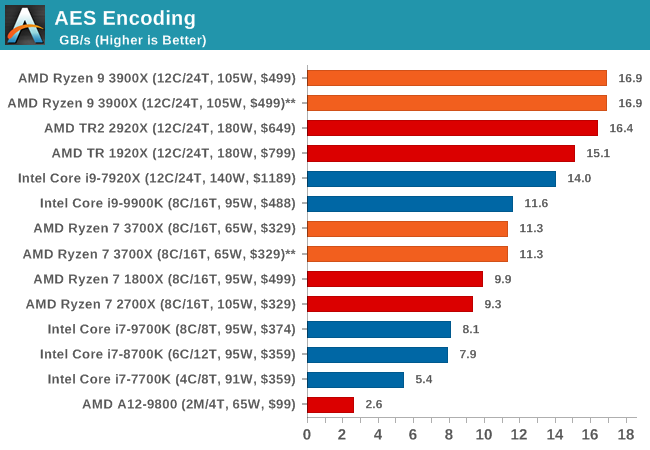










447 Comments
View All Comments
Korguz - Tuesday, July 9, 2019 - link
there is NO fraud about this.. better yet... where is your PROOF about this ? post some links to sites that are showing this.. if not drop it already.. you are just trying to spread lies, and BS...Maxiking - Tuesday, July 9, 2019 - link
My proof is this and any review on the internet, the advertised 4.6ghz is not being reached on the majority chips and if, only for 100 - 200ms and very sporadically. This is called FRAUD, I guess Intel should start selling their cpus with 5.3ghz boost because a few of them would be able to reach it for 100ms after pumping a lot of voltage into them like AMD does.PACougar - Tuesday, July 9, 2019 - link
Lol, a boost frequency is exactly that. It doesn't mean the chips will sustain the boost for any guaranteed period of time. Do you really think it's just a coincidence that you're the only one that's "outraged" by the expected operation of these chips? Guess what, when Intel ships a chip with a stated frequency, it's also a boost with no guarantee of duration. Stock 9900k's don't run continuously at 5ghz. Lol You look like a complete fool for talking about fraud where there is none.Korguz - Tuesday, July 9, 2019 - link
yea ok sure.. what ever maxiking.. you have NO idea how boost works, OR what the difference is between boost and max all core turbo is. the fact you wont post links to other sites that show this, also proves your are just trying to spread lies and BS. the only fraud i am seeing.. is you...Maxiking - Tuesday, July 9, 2019 - link
We are on the side which confirms my words in the review, forums, by their tweets. Yet you are blind to the facts. Check derbauer, gaming nexus, not gonna spoonfeeding you.Korguz - Tuesday, July 9, 2019 - link
let me ask you this... maxiking.. do you know the difference between boost clock. and all core turbo ? cause it sure seems you do NOT know the difference.. and others have pointed out to you that you are also wrong.. i wanted links.. to be sure i am looking at the same sites as you.. in the end.. you are just trolling.. and talking bs... drop this already..Qasar - Wednesday, July 10, 2019 - link
Check derbauer, gaming nexus... never heard of these sites.. i can see why Korguz is asking you to post links directly to where you are getting this, and i agree, BS from...Maxiking - Tuesday, July 9, 2019 - link
There is a debate going about this on every internet forum, so no I am not the only one concerned and the AMD subreddit has a dedicated thread about it as well.If Intel ships a chip with any stated boost frequency, the boosts are guaranteed on the per core usage basis. Stock 9900k runs at 5.0 ghz, the more cores are being used, the lower frequency..a single core always run @ 5.0ghz, all cores @ 4.7ghz. I already said it earlier. Sorry my friend, wrong example, the only fool here is you.
The fact is that Ryzen 3rd gen is a worse overclocker than the 2nd one. Or you know, I will give AMD the benefit of doubt. Before the reviews were up, the whole internet had been going crazy and thinking that 4.6 on all cores was possible, because "look at those boost frequency man". And that was the AMD intention. To use those sporadical 100 - 200ms spikes to spread the idea that the final product would able to reach them on all cores, to misguide. And I must say it WORKED brilliantly, ADOREDTV is now the biggest clown on the internet, easy 5ghz+, he said. I wonder if he makes ConLake style videos about this.
So yeah, that 4.6ghz boost is fraud. The majority can't reach it on a single core and the rest capable of doing so only by performing non frequent 100 - 200ms long spikes.
If Intel did this, oh god, what a shitstorm would be here, just like with their TDP, Meltdown, Spectre. Every review would be full of this. Don't blame me, I am just pointing at facts and making fun of petty suddenly blind amd fans. Don't shoot the messenger.
Korguz - Tuesday, July 9, 2019 - link
well.. 1st.. you didnt answer my question if you know the difference between boost clock and all core turbo.. 2nd.. you are the only one on here.. that is crying about this.. define every internet forum... also.. you do not seem to replying to any one else in this thread about this..Targon - Monday, July 22, 2019 - link
I've seen 4.4GHz without doing any BIOS tweaking on a 3900X on an Asus ROG Crosshair VI Hero. BIOS is still AGESA 1.0.0.2, so I haven't bothered to even try pushing to 4.6GHz yet. I wouldn't say that a boost to 4.6GHz with a good BIOS version isn't possible based on what I have seen with X370, and expecting that X570 has a good chance to be better about how to handle the new chips.As far as Intel and boost speeds, that is based as well on cooling. You try a 95W TDP rated cooler, and you will NOT be hitting anywhere close to 5.0GHz boost. You would need something significant. That 95W TDP is a fraud, because it only applies to base speeds, while the AMD TDP figures are in line with what most people will hit.